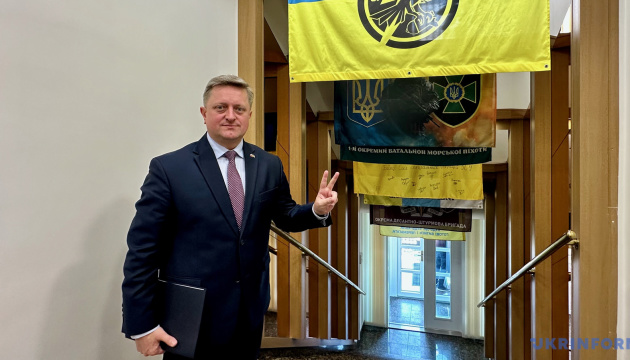
The change of government in the Czech Republic will not lead to any abrupt or radical actions regarding Ukrainians residing in the country.
Ambassador of Ukraine to the Czech Republic Vasyl Zvarych said this in an interview with Ukrinform.
The diplomat acknowledged that the topic of support for Ukrainian asylum seekers and attitudes toward the Ukrainian diaspora in the Czech Republic have sparked “a lot of emotions” amid certain statements by parties currently engaged in coalition talks – ANO, led by Andrej Babiš, and SPD, headed by Tomio Okamura.
“Objectively speaking, even if a partnership between ANO and SPD becomes possible, there should be no expectations of drastic or radical steps toward Ukrainians living in the Czech Republic,” the ambassador stated.
He explained that, first, the status of temporary protection and the rights of Ukrainian citizens are clearly defined at the EU level. Second, Ukrainians have become an important part of the Czech economy — hundreds of thousands are working, paying taxes, and integrating into local communities, and this is well understood at both local and national levels.
Zvarych cited data showing that last year, Ukrainians paid almost 450 million USD more into the Czech budget than they received in social benefits. This year, the surplus already exceeds 350 million USD and is expected to surpass last year’s figure by the end of the year.
“Ukrainians contribute more to the Czech budget than they receive. They are not taking jobs away from Czechs — on the contrary, they are sustaining the labor market, filling those niches where Czech employers struggle to find workers,” the ambassador noted. He emphasized that Czech businesses have raised no complaints or concerns about the presence of Ukrainians; rather, they consistently praise their professionalism, motivation, and creativity.
At the same time, the diplomat noted that the policies of some political forces that may enter the governing coalition could become tougher — discussions about “reviewing the scope of support” or political initiatives with a potentially discriminatory nature toward Ukrainians could arise. However, practical decisions do not depend solely on the government — they must go through parliament, municipalities, and civil society organizations, which remain supportive of Ukrainians, Zvarych underlined. He assured that the embassy would continue working to ensure the stability of support and prevent discriminatory measures.
“The Ukrainian community in the Czech Republic is no longer a ‘temporary factor,’ but a part of the country’s social and economic reality. And no government that seeks to act responsibly before its own citizens can afford to ignore this fact,” Zvarych concluded.
As reported, in the Czech parliamentary elections held in early October, the ANO party won and is currently negotiating to form a coalition, including with the far-right Freedom and Direct Democracy (SPD) party, known for its negative stance toward refugees, including Ukrainians.
Currently, the Czech Republic provides temporary protection to approximately 373,700 Ukrainian citizens — the third-highest figure in the European Union after Germany. In total, about 550,000 Ukrainians currently reside in the country.


